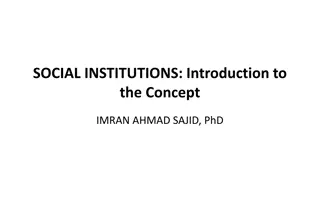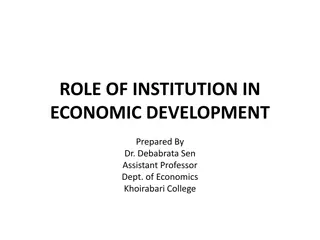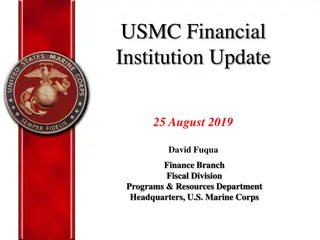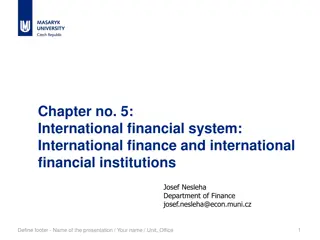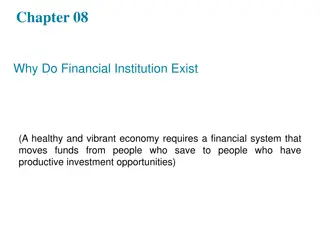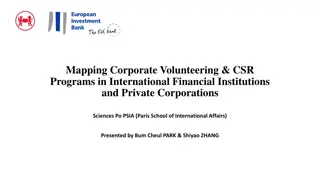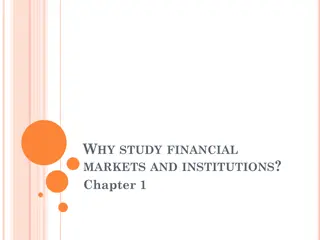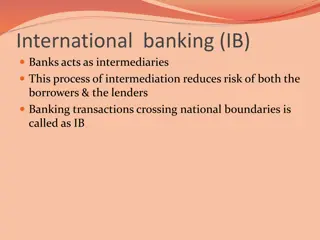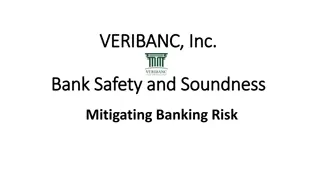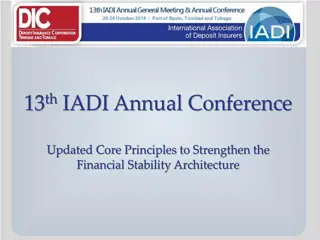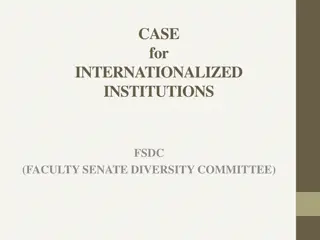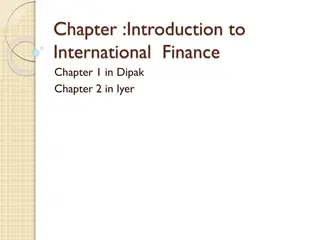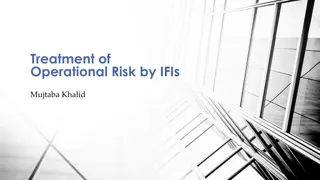FINANCIAL INTERMEDIARIES/FINANCIAL INSTITUTIONS
Discover the different types of financial intermediaries, including the unorganized and organized sectors. Learn about the institutions that facilitate financial transactions for individuals and corporations, such as local money lenders, commercial banks, and government agencies.
3 views • 6 slides
Role of Central Banks in International Financial Institutions
Central banks play a crucial role in the interconnectivity with international financial institutions like the Asian Development Bank (ADB) and the International Monetary Fund (IMF). These institutions aim to promote economic and social development, ensure exchange rate stability, provide financial a
1 views • 18 slides
World Bank group
The World Bank Group comprises five key institutions, each serving specific functions to support international development and financial assistance. These institutions include the International Bank for Reconstruction and Development (IBRD), the International Development Association (IDA), the Inter
4 views • 7 slides
International and Sustainable Finance
Delve into the Master's programs offered at FEB Campus Brussels focusing on international and sustainable finance. Learn about the diverse course curriculum covering financial markets, corporate finance, modern banking, investment banking, and more. Engage with expert faculty in areas such as sustai
4 views • 12 slides
Overview of AANAPISI Program in the United States
The Asian American and Native American Pacific Islander Serving Institutions (AANAPISI) Program aims to support institutions with a minimum of 10% Asian American and Native American Pacific Islander undergraduate enrollment. Currently, there are 54 funded AANAPISI institutions across 16 states and t
0 views • 13 slides
Understanding Financial Leverage and Its Implications
Financial leverage refers to a firm's ability to use fixed financial costs to amplify the impact of changes in earnings before interest and tax on its earnings per share. It involves concepts like EBIT, EBT, preference dividends, and tax rates, and can be measured through the degree of financial lev
1 views • 7 slides
Evolution of International Arbitration: Trends and Challenges
The evolution of international arbitration has seen a significant rise in cases over the years, with a focus on the interface between international law and international commercial arbitration. Key aspects explored include the impact of conventions like the New York Convention, the emergence of pro-
1 views • 20 slides
Working with International Collaborators: NIH Regional Seminar Overview
Explore key considerations when collaborating with foreign institutions for research projects funded by the National Institutes of Health (NIH). Learn about the significance of international research, NIH's investment strategies, the definition of a foreign component, and application eligibility cri
0 views • 43 slides
Understanding Financial Economics and Its Importance in Markets
Financial economics is a branch of economics focused on the distribution of resources in uncertain markets. It involves making decisions considering future events and creating models to analyze variables affecting decisions. Key aspects include working out portfolio risks and utilizing financial ins
0 views • 129 slides
Understanding Social Institutions: An Introduction by Imran Ahmad Sajid, PhD
Discover the concept of social institutions through Dr. Imran Ahmad Sajid's explanation. Explore how institutions are established practices that shape complex social forms, distinguishing between institutions and conventions, and their relation to society and culture. Delve into the role of institut
0 views • 14 slides
Role of Institutions in Economic Development: A Comprehensive Analysis
Understanding the significance of institutions in economic development is crucial, as they play a pivotal role in shaping societal, political, and economic relations. Institutions, defined as established customs or practices, act as the rules of the game that structure human interactions. Their qual
0 views • 13 slides
Albanian National Financial Education Strategy 2022-2027
The Albanian National Financial Education Strategy (NFES) aims to promote financial education for individuals, households, and MSMEs to enhance financial well-being and economic stability. It focuses on key interventions, foundational enablers, institutional coordination, funding, and monitoring. Fi
0 views • 19 slides
Artha Rin Ain 2003: Special Legislation for Financial Institutions' Debt Recovery
Artha Rin Ain 2003 is a special legislation aimed at enhancing the recovery process of outstanding debts of financial institutions in Bangladesh. The law addresses the shortcomings of previous acts and establishes dedicated courts for the swift resolution of cases involving unpaid claims. It encompa
0 views • 15 slides
Understanding the Impact of Globalization on Institutions and Societies
In today's globalizing world, the concept of globalization is reshaping interconnections between countries, challenging established institutions and norms. The process of globalization has far-reaching consequences, affecting areas like politics, economy, and culture. This interconnectedness has blu
0 views • 5 slides
Understanding Financial Statements Analysis in Business Finance
Understanding the analysis of financial statements is crucial for assessing the financial performance and position of an organization. This course provides knowledge, competencies, and skills necessary to apply basic financial statement analysis techniques, interpret financial numbers, and generate
0 views • 18 slides
Financial Services Institutions Support Value Chain Actors
Financial services institutions play a vital role in supporting various actors within the value chain, including exporters, wholesalers, banks, processors, and non-bank financial institutions. This ecosystem also involves technical training, business support, local traders, private investors, specia
0 views • 30 slides
Overview of Merchant Banking in India
Merchant banking in India traces back to the early 1960s, with Grindlays Bank pioneering the services in 1967. Over the years, foreign and Indian banks, as well as financial institutions, have ventured into this sector, offering services like managing share issues and providing financial consultanci
0 views • 8 slides
USMC Financial Institution Update - August 2019 Summary
The US Marine Corps provided an update on their financial institutions featuring key areas like program management, current issues, and a summary of institutions across different locations. Details include management personnel, the number of installations, types of financial institutions, and recent
1 views • 10 slides
Structural Transition and International Economic Institutions in Post-Independence India
Post-independence India initially focused on state-directed economic development, leading to a sizable public sector. However, in 1991, the country shifted towards a structural adjustment program, embracing liberal imports, market deregulation, privatization, and financial liberalization. This trans
0 views • 10 slides
Understanding International Financial Systems and Money Supply Dynamics
Explore the intricacies of the international financial system, including direct and indirect quotes, money supply, money demand, and equilibrium. Learn about foreign exchange rates, inflation, purchasing power parity, and the role of international financial institutions like the World Bank. Discover
0 views • 16 slides
Analyzing Systemic Climate Risk in the Financial Sector
This study discusses systemic climate risk in the financial sector by examining the effects of climate risks on financial institutions. It aims to design a market-based framework to assess the vulnerability of financial institutions to climate risks and analyze potential contagion effects. The frame
0 views • 39 slides
Understanding the Role of Financial Institutions in the Global Economy
Explore the significance of financial institutions in facilitating the flow of funds from savers to productive investments, essential for a healthy economy. Delve into topics like transaction costs, asymmetric information, adverse selection, and moral hazard in the financial system, along with basic
0 views • 19 slides
Understanding Social Institutions and Welfare in Human Society
Social institutions play a crucial role in addressing social problems and meeting the basic needs of human societies. Concepts of welfare and institutions like family, education, economy, and politics are explored. Welfare is described as traveling smoothly on the road of life, derived from the root
0 views • 21 slides
Raiffeisen Bank International AG: Banking Services and Global Presence
Raiffeisen Bank International AG is a leading corporate and investment bank in Austria, with a strong presence in Central and Eastern Europe (CEE) and expanding focus on Asia. They offer a wide range of financial services, including financing for Czech-Turkish export contracts. With a solid internat
0 views • 14 slides
Understanding Banking Institutions and Their Types
Banking institutions play a vital role in the financial sector by mobilizing public savings and providing funds to meet various financial needs. Commercial banks, investment banks, co-operative banks, and central banks are some examples of banking institutions. Scheduled banks enjoy certain benefits
0 views • 17 slides
Challenges Faced by Mexico Under CLCM and Establishment of Financial Institutions
Mexico faced challenges related to national security concerns and the establishment of branches of financial institutions under the Codes of Liberalisation of Capital Movements (CLCM). The country's entry into the OECD in 1994 marked a significant period of liberalization and reforms, including exte
0 views • 13 slides
Corporate Volunteering & CSR Programs in Financial Institutions
This presentation explores the significance of corporate volunteering and CSR programs in international financial institutions and private corporations, emphasizing the benefits for both employees and communities. It covers the rising trend of corporate volunteering, the impact of volunteer grants,
0 views • 11 slides
Financial Literacy Empowerment in Eastern and Southern Africa
Developing countries in Eastern and Southern Africa are prioritizing financial education to empower consumers in making sound financial decisions. Financial literacy enhances financial inclusion, stability, and economic growth. It involves awareness, knowledge, skills, attitudes, and behaviors essen
0 views • 23 slides
Understanding the Significance of Financial Markets and Institutions
Studying financial markets and institutions is crucial as it facilitates the efficient transfer of funds, promotes economic growth, impacts personal wealth, influences business decisions, and plays a significant role in determining interest rates. Debt markets, including bond markets, enable borrowi
0 views • 15 slides
Understanding Why Financial Institutions Exist
Financial institutions exist to provide crucial services like intermediation, risk management, and facilitating economic activities by connecting savers and borrowers. The global financial structure involves various institutions like banks, insurance companies, and securities markets. Key facts incl
0 views • 45 slides
Financial Literacy and Education Commission: Coordinating Federal Efforts
Financial capability empowers individuals to manage financial resources effectively, make informed choices, avoid pitfalls, and improve their financial well-being. The Financial Literacy and Education Commission (FLEC) works to improve the financial literacy of individuals in the United States throu
0 views • 16 slides
Understanding International Banking and Its Impact: Evolution, Features, and Crucial Events
International banking plays a vital role in facilitating global financial transactions, reducing risks for both borrowers and lenders. This article delves into the features of international banking, motives behind banks expanding into new markets, the evolution of international banking institutions,
1 views • 27 slides
Understanding VERIBANC Rating System for Financial Institutions
The VERIBANC rating system provides a simple two-part color code and star classification to assess financial institutions' current standing and future outlook. It considers factors like capital strength, asset quality, management ability, earnings sufficiency, liquidity, and market risk sensitivity.
0 views • 19 slides
Key Aspects of Crisis Management and Preparedness in Financial Institutions
This presentation delves into the critical components necessary for reducing the Too Big to Fail problem in financial institutions. It emphasizes the importance of comprehensive recovery and resolution planning to prevent government bailouts and mitigate losses effectively. The Key Attributes of Eff
1 views • 18 slides
Insights into the World Bank Group: Institutions, Sources of Income, and Functions
Delve into the workings of the World Bank Group through an exploration of its institutions, income sources, and functions. Discover how contributions from donor countries, membership dues, bonds, and loan repayments sustain the group. Learn about the five key institutions within the World Bank Group
0 views • 52 slides
Enhancing International Diversity in Higher Education: A Case Study
This case study focuses on the Faculty Senate Diversity Committee's efforts to promote internationalization within institutions by highlighting the impact of international students, faculty, and key themes from dialogues with international faculty. It emphasizes the economic contributions of interna
0 views • 10 slides
NORDRESS Project Governance and Administration Overview
The NORDRESS project involves various entities like the Executive Board, Council, Partner Institutions, and Supporting Institutions for day-to-day management, decision-making, and overall support. The Project Manager from the University of Iceland plays a central role, coordinating activities and li
0 views • 13 slides
Understanding Political Institutions and Their Significance in Governance
Dr. R.E.V. Gyampo, a lecturer in the Department of Political Science at UG College of Education, explains the concept of institutions, distinguishing between formal and informal ones. He emphasizes the importance of rules within institutions for predictability and behavior governance. The discussion
0 views • 14 slides
Understanding International Finance: Scope, Importance, and Challenges
International finance explores interactions between countries, including currency exchange rates, foreign direct investment, and risk management. The scope includes foreign exchange markets, MNC financial systems, and international accounting. It raises questions on liberalizing financial markets, I
0 views • 52 slides
Understanding Risk Management in Islamic Finance Institutions
Islamic Financial Institutions (IFIs) face various types of risks, including Shariah compliance, rate of return, displaced commercial equity investment, and operational risks. This content delves into how IFIs manage these risks through Shariah auditing, risk management for financial contracts, and
0 views • 35 slides









